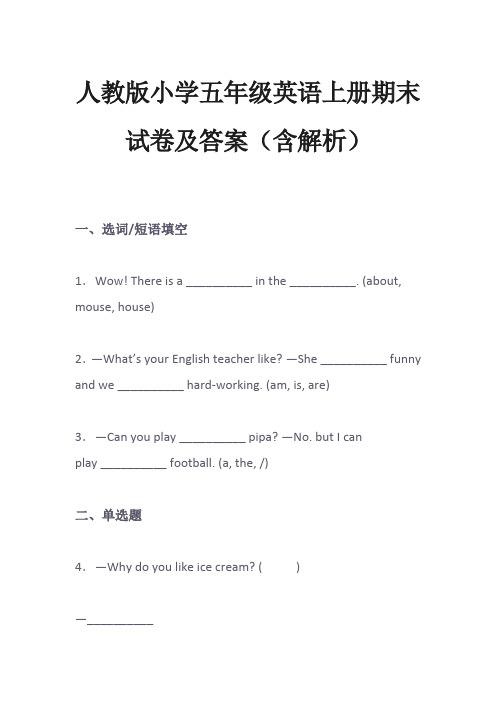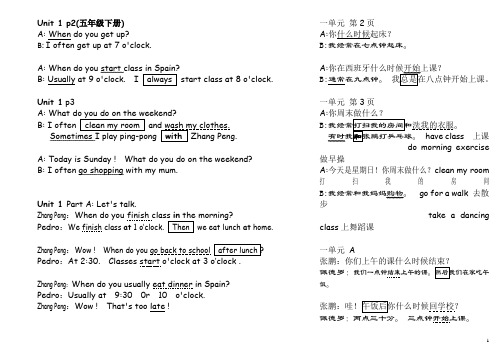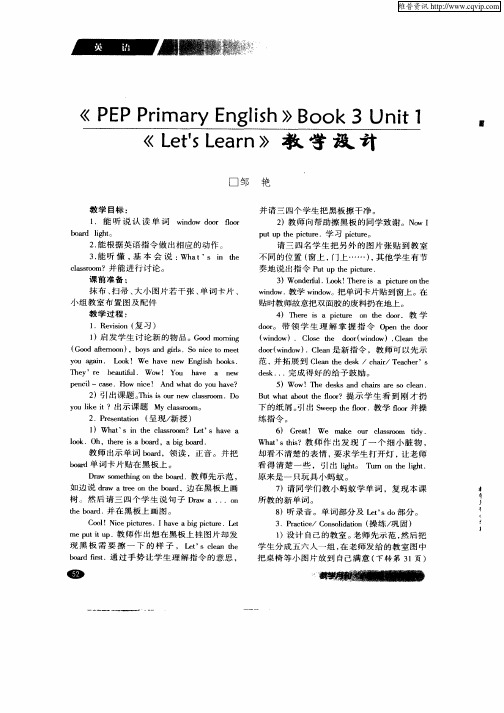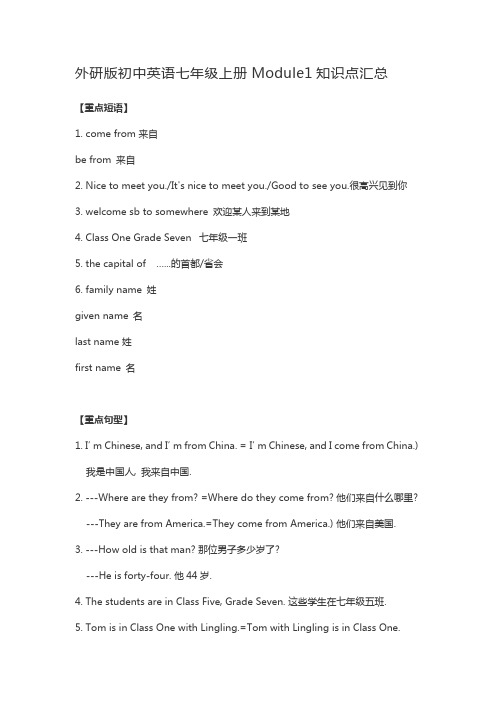Primary English For China(B1)
人教版小学五年级英语上册期末试卷及答案

人教版小学五年级英语上册期末试卷及答案(含解析)一、选词/短语填空1.Wow! There is a __________ in the __________. (about, mouse, house)2.—What’s your English teacher like?—She __________ funny and we __________ hard-working. (am, is, are)3.—Can you play __________ pipa? —No. but I canplay __________ football. (a, the, /)二、单选题4.—Why do you like ice cream? ( )—__________A.It is sweet.B.It is too hot.C.They are sour. 5.—__________ is in the room? ( )—There is a table beside the bed.A.What B.Where C.How6.—__________( )—A hamburger, please.A.Do you have a sandwich?B.What would you like to eat?C.What would you like to drink?7.—What can he do? ( )—__________A.She likes singing.B.She can sing Chinese songs.C.He can sing English songs.8.—What do you have on Fridays? ( ) —__________A.I have PE and English class.B.I have a hamburger and a carrot. C.My favourite food is ice cream.三、看图完成句子四、选内容补全对话/短文A: Hi, Linda. 14.B: I often go to the nature park.A: 15.B: No, I don’t. I often speak English with my friend.A: Wow! Great! 16.B: No, there isn’t. There is a lake.A: 17.B: Yes, there are, There are some trees, too. A: 18.B: Sure!A: Wonderful!A.Is there a river in it?B.What do you do on Saturdays? C.Can I go with you this Saturday? D.Do you often read books in that park?E.Are there any flowers?五、任务型阅读An email to Emma.To:***************From:****************.Dear Emma,Hi. My name is Julia. I study at Hope Primary School (希望小学). I go to school from Monday to Friday. My favourite day is Friday. We have art and PE on Fridays. We can do kung fu and dance in PE class.My favourite teacher is Miss Brown. She is our English teacher. She is young and pretty. Her class is so much fun.Yours,Julia19.阅读短文,判读正(T)误(F)。
This is me!【刷易错】(模块易错综合练)(含解析)七年级英语上册单元模块满分必刷题

2024-2025学年七年级英语上册单元模块满分必刷题(牛津译林版2024)Unit 1 This is me【刷易错】(模块易错综合练)(无锡专用)英语(考试时间:90分钟试卷满分:100分)第I卷(客观题共50分)一、单项选择在A、B、C、D四个选项中,选出可以填入空白处的最佳选项,并在答题卡上将该项涂黑。
(本大题共14小题,每小题1分,共14分)1.—Tom, what is your ________?—I like singing very much.A.name B.job C.hobby D.age2.I have ___________ piano at home. I often play ___________ piano after school.A.a; the B.a; a C.a; /D.the; /3.There _______ a red bag and a blue one on the desk.A.is B.are C.have D.has4.My brother is in _______.A.class two, grade seven B.Grade Seven, Class TwoC.Class Two, Grade Seven D.Class two, Grade seven5.___________ your ___________ long or short?A.Is; hair B.Are; hairs C.Does; hair D.Do; hairs6.—_______ class are you in?—Class 1.A.Which B.Where C.Why D.How7.I’m a new student ________ Sunshine Middle School.A.at B.in C.on D.by8.She is a pretty girl ________ long hair.A.with B.have C.has D.is9.My sister Suzy enjoys ________ music very much, and her favourite singer is Taylor Swift.A.hear B.hearing C.listening D.listening to10.Jason and Sean are good friends. They often help _________.A.another B.other C.the other D.each other11.—How are your grandparents?—______ of them are fine.A.Both B.All C.Each D.Every12.My English teacher has long black hair and ________.A.wear glasses B.wears glasses C.wear glass D.wears glass13.I want ________ a teacher and let’s ________ good friends.A.be; be B.to be; to be C.be; to be D.to be; be14.you good at ?A.Do, dance B.Do, dancing C.Are, dance D.Are, dancing二、完形填空先通读下面的短文,掌握其大意,然后在每小题所给的四个选项中,选出可以填入空白处的最佳选项,并在答题卡上将该项涂黑。
五年级英语下册课文及翻译

1 Unit 1 p2(五年级下册) A: When do you get up? B: I often get up at 7 o'clock. A: When do you start class in Spain? B: Usually at 9 o'clock. I always start class at 8 o'clock. Unit 1 p3 A: What do you do on the weekend? B: I often clean my room and wash my clothes. Sometimes I play ping-pong with Zhang Peng. A: Today is Sunday ! What do you do on the weekend? B: I often go shopping with my mum. Unit 1 Part A: Let's talk. Zhang Peng:When do you finish class in the morning? Pedro:We finish class at 1 o’clock. Then we eat lunch at home. Zhang Peng:Wow ! When do you go back to school after lunch ? Pedro:At 2:30. Classes start o'clock at 3 o’clock . Zhang Peng:When do you usually eat dinner in Spain? Pedro:Usually at 9:30 0r 10 o'clock. Zhang Peng:Wow ! That's too late ! 一单元 第2页 A:你什么时候起床? B:我经常在七点钟起床。
A:你在西班牙什么时候开始上课? B:通常在九点钟。 我总是在八点钟开始上课。
高中英语人教版 选择性必修第二册教案讲义:UNIT 2 BRIDGING CULTURES

UNIT 2BRIDGING CULTURES主题语境人与社会——跨文化沟通、包容与合作【背景文化】Misadventures in EnglishLast week, our forum① asked if you had any funny or strange stories about using English. We didn't expect to get so many posts②!Here are some of our favourites, to remind us that some of the English we learn in the classroom is rather different from the English in the outside world!Yancy: People say that the British always play safe③ with what they eat. Not true! I went to a summer school in Manchester and my English teacher was called Maggie. One day, a different teacher took our class. He told us that Maggie couldn't teach that day COZ she had a frog in her throat. Poor Maggie—but why did she try to eat such a big frog?Sophie: When I first visited New York, I went to a downtown shopping centre to buy some winter boots. At the information desk at the entrance, I asked a lady where the shoe section was. She said that it was on the first floor. So I went up to the first floor, but couldn't find any shoes. I decided to leave. When I was looking for the exit, I saw that shoes were actually sold downstairs on the ground floor, not the first floor. Why did she give me the wrong information?Julien: I've got an English penfriend, who I finally got to meet in London this summer. He had told me that his grandfather was “really wicked④”. But when I met his grandfather, I liked him a lot. I found it very odd⑤. Why did my friend use a negative word about such a nice man?Zheng Xu: The British must have really high standards. I was part of a student exchange programme between a university in England and my university in China. I spent days preparing and writing my first English paper. I knew I had done a good job and was looking forward to getting a positive comment. When I got the paper back, I found my teacher had written the comment “Not bad!” Not bad? But there weren't any errors⑥ in my paper.(选自外研版新教材必修第一册Unit 2)词汇积累①forum/'fɔːrəm/n.(因特网上的)论坛②post/pəʊst/n.帖子③play safe谨慎行事;避免风险④wicked/'wɪkɪd/adj.邪恶的;极好的⑤odd/ɒd/adj.奇特的,古怪的⑥error/'erə/n.错误,谬误Section ⅠReading and Thinking每/日/金/句:Not only can studying abroad help us learn different cultures and knowledge from foreign countries, it can also enrich our lives culturally and economically.海外留学不仅可以帮助我们从国外学习不同的文化和知识,还可以从文化和经济的角度充实我们的生活。
《PEP Primary English》Book 3 Unit 1 《Let‘s Learn》教学设计

2能根据英语 指令做 出相应 的动作 。 . 3 能 听 懂 , 本 会 说 : a ’ i h . 基 Wh t s n e t c s om l s o ?并 能 进 行 讨 论 。 ar 课 前准备 : 抹 布 、 帚 、 小 图 片若 干 张 、 词 卡 片 、 扫 大 单 小组 教 室 布 置 图 及 配 件
WhtShs a’ i t ?教 师 作 出 发 现 了 一 个 细 小 脏 物 , 却看不 清楚的表情 , 求 学生打 开灯 , 老师 要 让 看 得 清 楚 一 些 , 引 出 l h 。 T r n tel h . it g un o i t h g
原来是一 只玩具小蚂 蚁 。
教 学过程 :
请三 四名 学 生把 另外 的 图片 张贴 到教 室
不 同 的位 置 ( 上 , 窗 门上 … … ) 其 他 学 生 有 节 , 奏 地 说 出指 令 P t pt iue u u ep t . h c r
3 )Wo d r 1 L o ! h r s a p c r nte n ef . o k T eei it eo h u u
维普资讯
P P i a y E g h B P rm n l E r i s ook 3 U i 1 n t
一
L t e 教 学 汉 封 e ’L a n S r
口 邹 艳
教 学 目标 :
并请 三四个学 生把黑板擦 干净 。 wno or l r idw do fo o 2 )教 师 向 帮 助 擦 黑 板 的 同学 致 谓 。N w I } o
外研版初中英语七年级上册Module1~10知识点汇总

外研版初中英语七年级上册Module1知识点汇总【重点短语】1. come from 来自be from 来自2. Nice to meet you./It's nice to meet you./Good to see you.很高兴见到你3. welcome sb to somewhere 欢迎某人来到某地4. Class One Grade Seven 七年级一班5. the capital of …...的首都/省会6. family name 姓given name 名last name 姓first name 名【重点句型】1. I’m Chinese, and I’m from China. = I’m Chinese, and I come from China.) 我是中国人, 我来自中国.2. ---Where are they from? =Where do they come from? 他们来自什么哪里? ---They are from America.=They come from America.) 他们来自美国.3. ---How old is that man? 那位男子多少岁了?---He is forty-four. 他44岁.4. The students are in Class Five, Grade Seven. 这些学生在七年级五班.5. Tom is in Class One with Lingling.=Tom with Lingling is in Class One.=Tom and Lingling are in Class One. 汤姆和玲玲在一班.6. What about you?=How about you?=And you? 你呢?/你怎么样?7. Welcome to Class 6 Grade 7! 欢迎来到七年级六班。
E英语教程(第二版)1教学课件Unit 3
Situation 1
A and B are roommates. They are talking about how to spend the weekend.
Situation 2
Two students are talking about which sports show to watch on TV.
3 Role-play a conversation in pairs according to one of the situations. You may refer to the Functional language.
exhibition. What do you think of the paintings? Man: They’re strange. Woman: Strange? I 2) _d_o_n_’_t_t_h_in_k__so__. Monet is a very famous
impressionist painter. His use of color is amazing.
Listen to a news report and choose the best answer to each of the questions.
1 How many works of art are there in New York’s subway?
A. Less than 215.
B. More than 215. C. Less than 250. D. More than 250.
Scripts:
Man: Oh, what a crowd! Woman: It’s not really surprising. This is a Claude Monet exhibition. What
小学英语三年级上册单词表(人教版)
小学英语三年级上册单词表(人教版)新修订小学阶段原创精品配套教材小学英语三年级上册单词表(人教版)教材定制 / 提高课堂效率 /内容可修改Vocabulary list for third grade primary school English (People'sEducation Edition)教师:风老师风顺第二小学编订:FoonShion教育小学英语三年级上册单词表(人教版)unit 1pen [pen]钢笔pencil ['pens?l]铅笔pencil-case ['pens?lkeis]铅笔盒ruler ['ru:l?]尺子eraser [i'reiz?]橡皮crayon ['krei?n]蜡笔book [buk]书bag [b?ɡ]书包sharpener['?ɑ:p?n?]卷笔刀school [sku:l]学校unit 2head[hed] 头face[feis] 脸nose[n?uz] 鼻子mouth ]mauθ]嘴eye [ai]眼睛ear [i?]耳朵arm[ɑ:m] 胳膊finger['fi?ɡ?] 手指leg [leɡ]腿foot [fut]脚body ['b?di]身体unit 3red [red]红色的yellow ['jel?u]黄色的green [ɡri:n]绿色的blue [blu:]蓝色的purple ['p?:pl] 紫色的white [hwait] 白色的black [bl?k]黑色的orange ['?rind?] 橙色的pink [pi?k]粉色的brown [braun]棕色的unit 4cat [k?t] 猫dog [d?ɡ, d?:ɡ]狗monkey ['m??ki]猴子panda ['p?nd?]熊猫rabbit ['r?bit]兔子duck d?k] 鸭子pig [piɡ]猪bird [b?:d]鸟bear [bε?]熊elephant ['elif?nt]大象mouse ]maus, mauz]老鼠squirrel ['skw?:r?l] 松鼠unit 5cake [keik] 蛋糕bread [bred]面包hot dog 热狗hamburger ['h?mb?:ɡ?]汉堡包chicken ['t?ikin]鸡肉french [frent?] fries 榨薯条coke [k?uk] 可乐juice [d?u:s] 果汁milk[milk]牛奶water['w?:t?] 水tea[ti:]茶coffee ['k?fi]咖啡unit 6one [w?n]一two [tu:]二three[θri:] 三four [f?:]四five [faiv] 五six[siks] 六seven['sev?n] 七eight [eit]八nine[nain] 九ten[ten]十doll [d?l]玩具娃娃boat [b?ut]小船ball [b?:l]球kite[kait] 风筝balloon ]b?'lu:n] 气球car [kɑ:]小汽车plane [plein] 飞机人教版小学英语?三年级下册?单词表unit 1boy [b?i]男孩girl [ɡ?:l] 女孩teacher ['ti:t??] 教师student ['stju:d?nt]学生this [eis, 弱e?s] 这个my 我的friend [frend] 朋友i’m=i am 我是nice [nais]好的;愉快的good morning ['m?:ni?] 早上好good afternoon [,ɑ:ft?:'nu:n]" 下午好meet [mi:t]遇见;碰见goodbye [,ɡud'bai] 再见too [tu:] 也;太unit 2father ['fɑ:e?] 父亲;爸爸dad 爸爸口语mother ['m?e?]母亲;妈妈mom 妈妈口语man [m?n] 男人woman ['wum?n]女人grandmother ['ɡr?nd,m?e?] 外祖母grandma ['ɡr?ndmɑ:](口语(外)祖母grandfather ['ɡr?nd,fɑ:e?](外)祖父grandpa ['ɡr?ndpɑ:](口语(外)祖父sister ['sist?] 姐妹brother ['br?e?] 兄妹let’s=let [let] us [?s] 让我们great [ɡreit] 太好了really ['ri?li, 'ri:li] 真地;确切地and ?nd, 和;并且how [hau] 多么;怎么样unit 3eleven [i'lev?n]十一twelve [twelv] 十二thirteen 'θ?:'ti:n]十三fourteen ['f?:'ti:n]十四fifteen ['fifti:n]十五sixteen ['siks'ti:n] 十六seventeen [,sev?n'ti:n] 十七eighteen ['ei'ti:n] 十八nineteen [,nain'ti:n] 十九twenty ['twenti] 二十how [hau] many ['meni]多少can [k?n, k?n] 能够;可以look [luk] at [强?t, 弱?t]看;瞧unit 4peach [pi:t?]桃pear [pε?]梨orange ['?rind?] 橙子watermelon ['w?:t?mel?n]西瓜apple ['?pl] 苹果banana [b?'nɑ:n?] 香蕉strawberry ['str?:b?ri]草莓grape [ɡreip]葡萄like [laik]喜欢some [s?m, 一些;某些thanks 多谢unit 5bus [b?s]公共汽车bike [baik] 自行车taxi ['t?ksi] 出租车jeep [d?i:p]吉普车desk [desk]课桌chair [t?ε?]椅子walkman 随身听lamp [l?mp]台灯your [j?:, j?u, 弱j?] 你的;你们的zoo [zu:] 动物园unit 6small [sm?:l] 小的big [biɡ]大的long [l??, l?:?] 长的short [??:t] 短的;矮的tall [t?:l] 高的giraffe [d?i'rɑ:f] 长颈鹿deer [di?] 鹿人教版小学英语?四年级上册?单词表unit 1 unit 3window:['wind?u] 窗户thin [θin] 瘦的board:[b?:d] 木板strong [str??] 强壮的, light:[lait] 光线quiet [kwai?t] 安静的picture:['pikt??] 画friend [frend] 朋友door:[d?:] 门chinese [t?a?ni:z, -ni:s] 中国的floor:[fl?:] 地板like [laik] 喜欢classroom:['klɑ:srum] 教室his [hiz, ?z] 他的many:['meni] 许多的photo [f?ut?u] 照片our:['au?] 我们的has [h?z有classmate:['klɑ:smeit] 同学name [neim] 名字seat:[si:t] 座位he [hi: 他near:[ni?] 近的teacher [ti:t??,ti?t??(r)] 教师what:[hw?t] 什么student [stju:d?nt] 学生in:[in] 在...里,music [mju:zik] 音乐the:[e?] 这(个),那(个science [sai?ns] 科学we:[wi:] 我们sport [sp?:t] 运动have:[h?v] 有,拥有right [rait] 正确的new:[nju:] 新的;新鲜的;新型的boy [b?i] 男孩go:[g?u] 去;离去girl [ɡ?:l] 女孩where:[hw??] 在哪里unit 4computer:[k?m'pju:t?] 电脑,电子计算机study [st?di] 学习wall:[w?:l] 墙bathroom [bɑ:θrum] 浴室fan:[f?n] 扇子bedroom [bedru:m, -r?m] 卧室clean:[kli:n] 清洁的kitchen [kit?in] 厨房you:[ju:] 你;你们fish [fi?] . 鱼see:[si:] 看见here [hi?] 在这里me:[mi:] 我home [h?um] 家look at:[luk] [?t] 看room [ru:m] 房间unit2 school [sku:l] 学校chinese book:['t?ai'ni:z][buk] 语文书phone [f?un] 电话english book:['i?gli?] [buk] 英语书bed [bed] 床,math book [m?θ] [buk] 数学书。
仁爱英语九年级下册全册教案
2010春季九年级教案Unit 5 Knowing About ChinaTopic 1 How much do you know about China?Section AThe main activity is 1a.I . Teaching aims and demands:1. Learn some new words and phrases:2. Learn the attributive clauses which use“that”or“which”.3. Learn about the geography of China.4. Cultivate the students’ patriotism through learning about the geography of China.II. Teaching aids:五岳的图片/幻灯片/中国地图/录音机III.Teaching ways: Five-finger Teaching PlanStep 1 Review (时间:5分钟)1.让学生尽可能地用英语和同伴谈论他们最喜爱的名胜,培养他们的爱国之情。
导入新课。
(呈现一些五岳等名胜的图片,引导学生快速谈论My favorite place is ...,激发他们的英语思维。
)2.Pair work.谈论My favorite place is …,并对其加以描述。
让1-2组学生表演。
T: Well done. You’ve just talked about many places of interest. As we know, China is a great country. It has ab out 5 000 years of history. Do you want to know more about it? OK, let’s come to the new unit.Step 2 Presentation (时间:13分钟)继续谈论中国的名胜古迹,呈现1a内容,引出并学习文中生词及定语从句。
Module 1 Unit 2、Unit 3 知识点详解-外研版八年级下册英语
外研版英语八(下)Module 1 Feelings and impressions 知识点详解Unit 2 I feel nervous when I speak Chinese.★(A2).【知识点再现】Welcome to China. 欢迎来到中国【知识点1】Welcome to+地点。
意为“欢迎来到某地”。
如:Welcome to Guilin. 欢迎来到桂林。
★(A2).【知识点再现】Thanks for your last message. 谢谢你的上一封邮件。
【知识点2】thanks for意为“因……而感谢某人”,相当于thank you for。
for是介词,意为“因为”,其后接名词、代词或动名词作宾语。
thanks to意为“多亏了,由于”。
如:Thanks /Thank you for your help. 谢谢你的帮助。
Thanks /Thank you for your pencil. 谢谢你的铅笔。
Thanks/Thank you for helping me. 谢谢你帮助我。
Thanks/Thank you for making us see sense. 谢谢你让我明白了道理。
【知识点3】【辨析】message,information与news的用法辨析:①message含义较广,可指书面、口头、无线电等多种渠道传来的信息,因而有“消息、口信、电报”等意思,为可数名词。
message的常用搭配:get/receive a message收到信息;leave a message留言;send a message发送信息;take a message捎口信。
如:He left a message for you. 他给你留言了。
I have an important message for you. 我有一条重要的信息要告诉你。
②information作“信息”解,通常指在阅读、观察、谈话或书信往来中特别关注的消息、情报、资料等。
- 1、下载文档前请自行甄别文档内容的完整性,平台不提供额外的编辑、内容补充、找答案等附加服务。
- 2、"仅部分预览"的文档,不可在线预览部分如存在完整性等问题,可反馈申请退款(可完整预览的文档不适用该条件!)。
- 3、如文档侵犯您的权益,请联系客服反馈,我们会尽快为您处理(人工客服工作时间:9:00-18:30)。
1 Primary English For China (B1) Book1 Words & expressions Translate the following words and expressions into Chinese (把下列单词和短语翻译成汉语) Unit 1 saying hello (打招呼) 1 hello int._________________ 2 hi int.____________ 3 good adj.________________ 4 morning n. ___________ 5 how adv.. __________ 6 are v. _________________ 7 you pron.______________ 8 fine adj.______________ 9 thank v._______________ 10 goodbye int. _____________ 11 here adv. ____________ 12 is v.__________________ 13 a art.___________ 14 balloon n.____________ 15 oh int.____________ 16 no _int.____________ Unit 2 Making friends(交朋友) 1 afternoon n. _____________ 2 I pron. ______________ 3 am v._____________ 4 my pron. _______________ 5 name n.______________ 6 what pron______________ 7 your pron. _____________ 8 nice adj._______________ 9 meet v. ____________ Unit 3 My classroom(我的教室) 1it pron._______________ 2 computer n. ____________ 3 desk n. ._____________ 4 chair n.________________ 5 fan n. ___________ 6 light n _________________ 7book n. _______________ 8 this pron. _____________ 9 classroom n. ________________ 10 sorry adj. ____________ 11 Miss n. ___________ ___ Unit 4 My school things(我的学习用品) 1 bag n._________________ 2 pencil n ____________ 3 pencil-box n ________________ 4 pen n _____________ 5 ruler n _____________ 6 rubber n _________________ Unit 6 Playing a game (做游戏) 1 point v. _______________ 2 point to______________ 3 the art.___________________ 4 board n. _______________ 5 door n.______________ 6 window n. ________________ 7 look v. _______________ 8 look at _______________9. sit v._____________________ 10sit down_______________ 11 stand v . ____________ 12 stand up_______________ 13 open v._____________ 14 close vt. _____________ 15 out adv.__________________ 16 children n. __________ 17 Mr.(Minister) n._______________ 18 please adv. Unit 7 My body (我的身体) 1 mouth n. ________ 2 nose n.________ 3 eye n. __________4 ear n. _________ 5 finger n. ________ 6 one ___________ 7 two _____________ 8 three _______________ 9 four ____________ 10 five ____________ 11 six _____________ 12 seven _____________ 13 eight___________ 14 nine_____________ 15 ten ___________ 16 yes _____________ 17 and ______________ Unit 8 fruit (水果) 1 an art. ___________2 apple n. _______________ 3 banana n. ________________ 4 pear n.___________ 5 lychee n. ______________ 6 orange n._______________ 7mum n.____________ 8 fruit _______________ 9 salad n. _____________ Unit 9 Colours(颜色) 1 red n _________ 2 blue n ________ 3 yellow n. __________ 4 orange n _________ 5 brown n__________ 5 me pron. ___________ 6 very adv.________________ 7too adv.___________ 8 ow int._________
( 共94 words) 2
Primary English For China (B1) Book1 Words & expressions Translate the following words and expressions into Chinese (把下列单词和短语翻译成汉语) Unit 1 saying hello (打招呼) 1 喂,你好._________________ 2 喂,你好___________ 3 好________________ 4 早上___________ 5 怎么,如何_______ 6 是 _________________ 7 你;你们;您.______________ 8 好的_____________ 9 谢谢_______________ 10 再见_____________ 11 这里,在这里____________ 12 是__________ 13 一(个,件)_________ 14 气球___________ 15 哦,唷,哎呀_______ 16 不,不是____________ Unit 2 Making friends(交朋友) 1下午_____________ 2 我(主格). ______________ 3 是 ___________ 4 我的______________ 5 名字____________ 6 什么_____________ 7 你的____________ 8 令人愉快的,好的______________ 9 遇见,见到 ____________ Unit 3 My classroom(我的教室) 1它 _______________ 2 电脑__________ 3 桌子_____________ 4 椅子______________ 5 扇子;风扇;迷 ___________ 6光_______________ 7书,本子__________ 8 这,这个____________ 9 教室______________ 10 对不起,抱歉____________ 11 小姐;女士(称呼未婚女子)__________ ___ Unit 4 My school things(我的学习用品) 1 书包________________ 2 铅笔__________ 3 铅笔盒______________ 4钢笔____________ 5 尺子____________ 6 橡皮_______________ Unit 6 Playing a game (做游戏) 1 指,指向_______________ 2 指向____________ 3 这(那)个(定冠词)_____________ 4 板,黑板______________ 5 门____________ 6 窗户_____________ 7 看,观看 ____________ 8 查看,看_______________ 9. 坐_________________ 10坐下______________ 11 站 ____________ 12 起立______________ 13 打开_____________ 14 关,关上________ 15 出局,淘汰_______________ 16 (复)孩子,儿童 __________ 17 先生(用于姓名前)_____________ 18 请 ________ Unit 7 My body (我的身体) 1 嘴______________ 2 鼻子_________ 3 眼睛_________ 4 耳朵 _________ 5 手指__________ 6 一____________ 7 二___________ 8 三______________ 9 四 ____________ 10 五____________11 六__________ 12 七___________ 13 八__________ 14 九___________ 15十 __________16 是的____________ 17 和______________ Unit 8 fruit (水果) 1 一(个,件)__________2 苹果_____________ 3 香蕉______________ 4 梨________ 5荔枝___________ 6 橙子,橘子_______________ 7(口语)妈妈__________ 8 水果_____________ 9 色拉_____________ Unit 9 Colours(颜色) 1 红色的________ 2蓝色的______ 3 黄色的_________ 4 橙色的_______ 5褐色的,棕色的_________ 5 我(宾格)_________ 6 很,非常______________ 7也,还_____ 8 哎哟,哦_________
